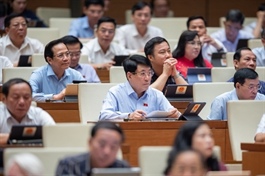Businesses call for greater transparency in State governance
Businesses call for greater transparency in State governance
Businesses expressed concerns about the shortage of orders, difficulties in obtaining credit, red tape, and the possibility of being prosecuted for economic offenses.
Local businesses call for greater transparency and openness in Government, which is seen as an effective way to support economic recovery and speed up the decision-making process among agencies and units.

Electronics production at Vingroup's manufacturing plant in Hoa Lac Hi-tech Industrial Park. Photo: Thanh Hai/The Hanoi Times |
The recommendation was made following a survey conducted by the Private Economic Development Research Board (Board IV) on the state of businesses and their view of the economic outlook for the remainder of 2023.
The survey, conducted by Board IV at the end of April with the participation of nearly 9,560 companies, suggested a gloomy economic outlook.
Specifically, 82% of enterprises said they intend to downsize, suspend operations, or cease operations in the coming months of this year. Of the companies that plan to continue operating, more than 71% plan to reduce their workforce by more than 5%, with 22% considering a reduction of more than half.
Nearly 81% of companies expect revenues to decline by more than 5%, while 29.4% anticipate a decline of more than 50%.
The survey also revealed that business confidence is particularly low, with over 81% of respondents expressing a negative or very negative view of the economic outlook for the remainder of the year.
The four main challenges faced by businesses include a lack of orders, difficulties in accessing credit, burdensome administrative procedures and the risk of being criminalized for economic infringements. In addition, local authorities have not provided adequate support, with 84% of businesses rating their assistance as "inefficient".
To address these challenges, businesses have proposed several solutions. They recommend cost-cutting measures to improve competitiveness. For example, businesses suggested extending the deadline for the 2% VAT reduction to the end of 2025 instead of the end of this year.
Other suggestions include reducing labor costs by lowering union dues and social security contributions, and considering adjustments to the personal income tax threshold.
Businesses have also asked banks to create more favorable conditions for businesses to access credit.
"There should be a preferential credit package specialized for key manufacturing industries and sectors, focusing on small and medium enterprises," Board IV said.
Board IV added that it is necessary to avoid tightening credit for real estate projects related to social housing, hospitals, schools and production infrastructure.
In addition, improving the business investment environment is essential, with surveyed companies expecting the authorities to refrain from unnecessary new regulations.
To address external challenges, businesses said the government should prioritize intensifying trade negotiations to diversify input markets, particularly in garments, leather and footwear, and furniture. Similarly, efforts should be made to expand output markets and reduce dependence on traditional markets.
According to a report by the Economic Committee of the National Assembly, the overall health of enterprises is deteriorating and the economic situation is highly challenging. In the first four months of the year, about 79,000 new or restarted businesses were registered. On average, about 19,700 new enterprises are established or resume operations each month.
On the other hand, more than 19,200 companies are exiting the market each month. Many are struggling with mounting debt repayment pressures, prompting them to sell shares at significantly reduced prices, often to foreigners.
The shortage of orders is a widespread problem for businesses, leading to job losses in various industrial parks. According to the Vietnam General Confederation of Labor, between September 2022 and January 2023, nearly 547,000 employees from 1,300 enterprises experienced reduced working hours due to dwindling orders. Of the total, 75% of these affected employees work in foreign direct investment (FDI) enterprises.

























